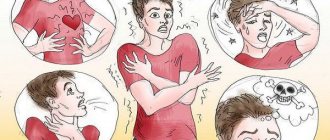Aggressive behavior is a complex syndrome, expressed by the emergence and embodiment of a person’s hostile qualities, the manifestation of sharply negative feelings towards others. The patient strives to commit violent acts, trying in every possible way to show his superiority and strength over others. Aggression is often accompanied by a desire for power. In most cases, the disorder requires psychological correction, identification of causes and treatment. Diagnosis and therapy of aggressive behavior is one of the areas of our work.
Why does aggressive behavior occur?
The occurrence of attacks of aggression in a person can be caused by one or several reasons at the same time.
Mental disorders can be caused by:
- pathopsychological character traits;
- mental stress, especially in people with weak character traits;
- pathological dependence on psychoactive substances (alcohol, drugs, medications, aerosols, plant substances), which have destructive qualities in relation to the nervous system and human psyche;
- unsettled life and personal problems (loss of family, job, health). By aggressive behavior and outbursts of anger, a sick person with specific character traits seems to be trying to “throw out” the internal pain from disorder;
- mental manifestations of borderline states (neuroses), improper upbringing, conflicts in the family;
- chronic overwork with lack of sleep, work accompanied by excessive strain;
- passion for computer games with aggressive content, frequent viewing of films of similar content;
- mental illnesses (epilepsy, schizophrenia, psychopathy, etc.);
- age-related dementia is the cause of senile aggression.
Causes of irritability
Social provoking factors include deliberate incitement, propaganda of violence in the media, incitement of ethnic conflicts, racist calls, encouragement to carry weapons. The external environment can also provoke an attack of anger. A negative reaction occurs to:
- heat,
- cold,
- temperature difference,
- strong wind,
- noise,
- crowded public transport
- stuffiness,
- heavy smoke from cigarette smoke,
- unpleasant smell.
A person may also have a genetic predisposition to aggression. Irritability is provoked by various prejudices passed on from generation to generation.
Forms of manifestation of the disease
Attacks of aggression can manifest themselves in:
- physical fitness (assault),
- verbal form (shouting and swearing),
- hidden version (nurturing ideas of jealousy, hatred, etc.).
Aggression can be direct and indirect, as well as obvious and hidden, without cause. Listed here are just some of the main manifestations of this condition. Outstanding scientific psychologists and psychiatrists have created voluminous classifications that take into account many of the subtleties of this sociopathological process.
Aggression in men (somewhat less often in women) can have benign traits that are embodied in professional activities. People with such behavior are characterized by courage, bravery, courage. A malignant manifestation of the disorder is rudeness, cruelty, callousness, arrogance, and a tendency to violent ideas and actions.
The most often negative-aggressive type of behavior is characteristic of children and adolescents. With age, it goes away, being replaced by productive and purposeful types of mental personality traits. Self-affirmation and a kind of defensive version of aggressive behavior may well manifest itself in cruel and even sadistic behavior in children. This variant of pathology requires mandatory therapy. Some people themselves notice the destructive nature of periodic attacks and try to get rid of this deficiency on their own. In such cases, they often resort to the help of specialists - psychologists or psychiatrists.
Irritability and aggression in women
Drinking alcoholic beverages can lead to aggressive behavior. More terrible is female alcoholism. The patient loses his mind, can commit any immoral act, sober up and not even remember what happened. Addiction is characterized by complete degradation of personality. Increased irritability in women can also be triggered by a craving for drugs. In this case, all a person’s actions and thoughts come down to searching for the next dose. Fear of withdrawal drives immoral actions. Excessive aggressiveness may be caused by the drug.
How is aggressiveness diagnosed in medical care?
The need for treatment of this mental disorder is determined only by a specialist - a psychiatrist.
To do this, it is necessary to conduct a comprehensive examination, including:
- inspection;
- survey;
- conversation;
- psychological tests;
- observation.
A psychologist takes part in solving the diagnostic problem, and, if necessary, doctors of other profiles - a neurologist, an endocrinologist, a pediatrician. Some cases require hospitalization of the patient.
Aggression
Aggression, aggressive behavior, suppressed and repressed aggression, latent and overt, physical and psychological, in particular verbal - all these concepts are quite complex and are studied by many sciences. In relation to medicine, most sources that provide a definition of aggression emphasize the purposeful desire to cause this or that damage, harm, injury, mental discomfort to another person - and analyze various, very numerous options for motivating aggressive behavior. However, it is not always the person who becomes the object of aggression: it can be an innocent plate, a pet or, say, a special doll for beating in a psychological relief room. Aggression, finally, can be directed at oneself, taking a variety of forms, from self-cutting or verbal self-deprecation to complete suicide. Outbursts of aggressive behavior are observed in the clinic of many mental disorders and conditions (the aggressiveness of sociopaths is widely known, for example), although the prevailing idea of all mentally ill people in general as dangerous and aggressive people (a stereotype of public consciousness, repeatedly studied on large statistical material) is absolutely not true.
The problem of aggression is dual and paradoxical, like many other problems caused by the unique phylogeny of man as a biological species. On the one hand, there is no need to dwell in detail on large and small, individual and public, even global, tragedies and catastrophes, which are based on uncontrolled, unbridled or propaganda-induced aggression. On the other hand, a certain level of aggression and the instinct for aggressive behavior are inherent in nature itself as one of the most important mechanisms of evolution (it is no coincidence that the sexual behavior of many animals is very reminiscent of or exactly imitates aggression). In all likelihood, one of the fundamental tasks of man and humanity, if we believe in further evolution and civilization, will be the search for universal, truly human and more effective (than current pedagogy, sports, various competitions, etc.) ways to channel the colossal destructive energy of aggression into the energy of creation, creativity, overcoming, achievement.
Treatment of patients carried out at the Verimed clinic
Before starting treatment, it is important to understand the cause of the attacks and the severity of the reaction itself. If the manifestation is minor and there are no pathomorphological reasons, the patient may be recommended to study with a psychologist. Treatment of outbursts of aggression characteristic of mental pathologies requires the mandatory use of medications.
For these purposes, specialists at the Verimed clinic use:
- benzodiazepine tranquilizers. This group of sedatives is recommended for neurotic disorders, the usual acute variant of aggressive behavior in sociopsychopaths;
- neuroleptics. Medicines of this class give a pronounced effect in mental pathology of an organic nature. For mental illnesses accompanied by hallucinations, illusions, personality degradation, and inadequate reactions. Most often we are talking about schizophrenia, manic-depressive psychosis, sometimes epilepsy, and severe forms of psychopathy. To treat unmotivated aggression, various forms of drugs can be used - in the form of injections, tablets for oral and sublingual use. Each method has its own advantages. Complicated options require injection treatment. In milder cases, especially when patients are aware of the problem, it is quite enough to get by with pills;
Important: Taking medications must be combined with psychotherapeutic effects, which provide indispensable help in eliminating an acute aggressive attack.
After eliminating the acute form of aggression, it is necessary to construct a plan of treatment measures that will be used for a long time. You should definitely find out what type of treatment is most appropriate in a particular case: outpatient or inpatient. To do this, it is necessary to understand the attitude and self-perception of the patient himself. Does he have an awareness of his painful condition, and does he want to get rid of it himself? If the patient has a positive attitude, the necessary medications can be prescribed to be taken at home. It is better if the use of prescribed medications is additionally monitored by someone close to you.
The most difficult options are forms of treatment for aggression in men. Especially if such attacks are unmotivated. In addition, men are the patients who most often refuse medical care. Therefore, when choosing a therapeutic plan, the doctor must place increased emphasis on psychotherapy and motivation of the patient.
Treatment of aggression in women is most often based on eliminating hormonal problems that cause mental disorders. Aggression in an elderly person in most cases is the result of senile degradation (dementia), based on the development of cerebrovascular insufficiency. “Falling into childhood” with childhood fears, subsequent flattening of emotions, irritability require the use of special drugs that improve cerebral circulation and metabolism of brain cells. Correct and timely administration of the necessary medications for senile aggressiveness allows one to achieve good clinical results.
A separate group consists of patients who combine depression with aggression. They require inpatient monitoring and proper selection of drugs and doses. Psychotherapy plays an important role in the treatment of all types of pathology. All its types are used: rational persuasion, suggestion, hypnosis, treatment in groups.
Causes of severe irritability
Severe irritability can occur for the following reasons:
- Increased activity of the thyroid gland. It causes increased production of a hormone that affects many body functions, including brain function.
- High concentration of cholesterol. More precisely, it is not the cholesterol itself that is to blame, but the drugs taken to reduce its level.
- Diabetes. Low sugar levels lead to metabolic imbalance and frequent outbursts of anger.
- Depression. Constantly being in a bad mood cannot but affect the reaction to certain events.
- Suffered a stroke. This phenomenon is not unique, because a stroke leads to the death of brain cells. If the frontal lobe, which is responsible for controlling emotions, is damaged, then a person can very easily lose control in almost any situation.
Contact us, don’t be left alone with the problem, we will help you understand yourself and improve your life!
What to do if you encounter a person during an outburst of aggression
If you are faced with inadequacy, then you should adhere to simple rules:
- Do not enter into any disputes with the aggressor.
- Speak to him in a friendly, quiet and reassuring manner.
- Maintain a calm appearance, do not shout, do not run, do not turn your back to him.
- Try not to let such a person get close.
- At the first opportunity, try to leave (run away), or call other people for help.
Have you noticed that you or someone close to you is beginning to experience attacks of aggression? Remember that the sooner you seek help, the less time it will take to correct your behavior. Call and sign up for a consultation - we will definitely help you!
Causes of increased irritability
Increased irritability can occur for a variety of reasons. Most often this is due to improper planning of your own time. Thus, with monotonous and monotonous work, the inability to properly rest or allocate time for this can lead to regular rush jobs, and, accordingly, chronic fatigue and increased irritability.
A person who is in such conditions increasingly experiences anxiety, weakness and sudden mood swings. He can be lethargic and apathetic, and the next moment he can be irritated over some little thing. His health worsens, he feels hot and cold. Sometimes the cause of increased irritability can be an unstable psyche. They get irritated even when a small difficulty arises. If the trouble is more serious, then they simply lose their temper.











